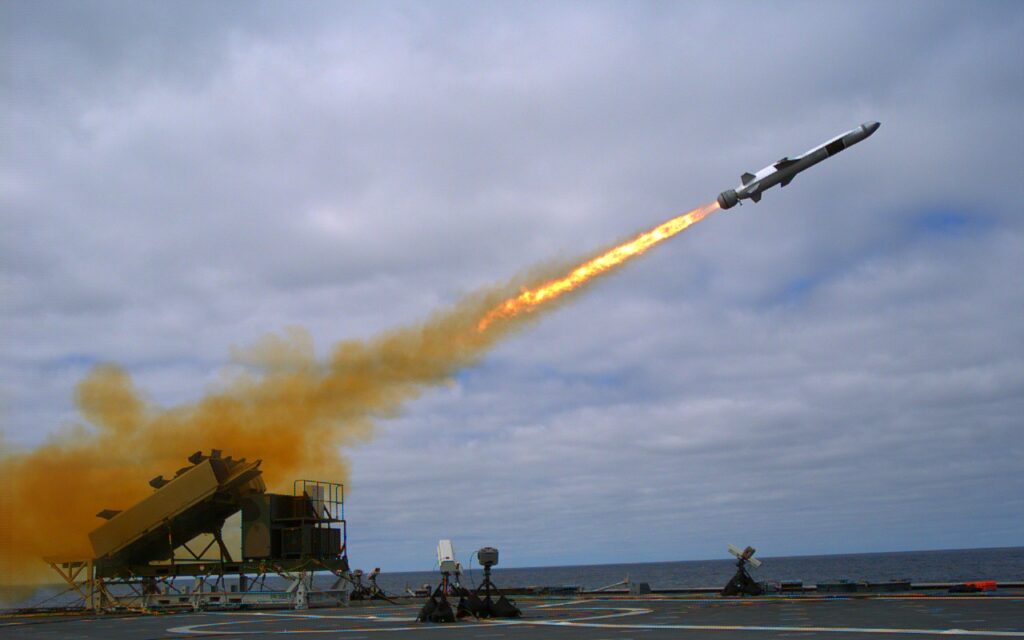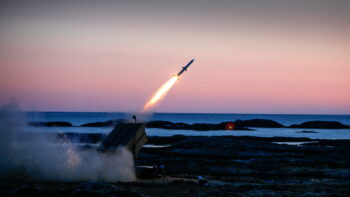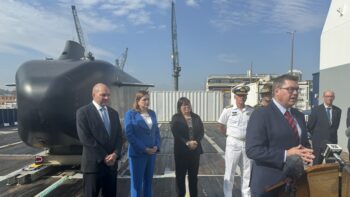
The Litorral Combat Ship Coronado test-fires a Norwegian-made Naval Strike Missile. (U.S. Navy)
WASHINGTON: Norway and Germany today announced an agreement to jointly purchase submarines and a supply of Naval Strike Missiles, in a move to bolster both their interoperability and, hopefully, drive down costs.
The deal, part of a long-term strategic cooperation agreement that the countries signed in 2017, will provide four Thyssenkrupp-made 212CD class submarines for the Norwegians and two for the Germans, as well as Kongsberg-produced missiles to be used by both countries.
“Working on these agreements we have gained valuable insights into our respective organizations, cultures and processes. This forms a solid basis for long term cooperation between Norway and Germany,” said Mette Sørfonden, a senior acquisition official in the Norwegian military, according to a statement published by the military’s chief procurement agency.
Both nations are members of NATO, an organization famously focused on finding ways to drive interoperability among its members, with various levels of success. Having both navies operating the same equipment, coming online around the same time, should allow for easy joint operations moving forward.
The six submarines are worth approximately 5.5 billion euros, according to a statement from the German company. Construction on the first boat, slated for Norway, is scheduled to begin in 2023 and be delivered in 2029. The two German subs are slated for delivery in 2032 and 2034.
Thyssenkrupp said it previously invested around 250 million euros in 2019 to prepare for forthcoming contract.
“The aim is to further develop Thyssenkrupp Marine Systems at the Kiel location into an international centre of competence for the construction of conventional submarines. Construction of a new shipbuilding hall has already begun, and progress is clearly visible at the shipyard site,” according to a company statement.
Neither statements from the Norwegian Defence Materiel Agency nor Kongsberg specified the number of missiles the deal included.
“Both the new submarine class and the NSM represent the most modern and advanced high-end technology equipment that exists in the world today. Kongsberg is proud to be in the front seat in this journey,” Eirik Lie, president of Kongsberg, said in a July 8 statement.
The Norwegian Ministry of Defence in March announced it had reached an agreement with the companies, but was awaiting approval by the German parliament before finalizing the contract.
“The submarine capability will be essential in securing our northern flank, as well as NATO’s. In addition, we are leveraging economy of scale by operating identical submarines. The submarine project is intrinsically connected to the common procurement of the modern anti-surface Naval Strike Missile, as well as joint development of a Future Naval Strike Missile,” according to a March statement.
Norway’s air defense priorities: Volume first, then long-range capabilities
“We need to increase spending in simple systems that we need a huge volume of that can, basically, counter very low-tech drones that could pose a threat,” Norway’s top officer told Breaking Defense, “so we don’t end up using the most sophisticated missile systems against something that is very cheap to buy.”


























